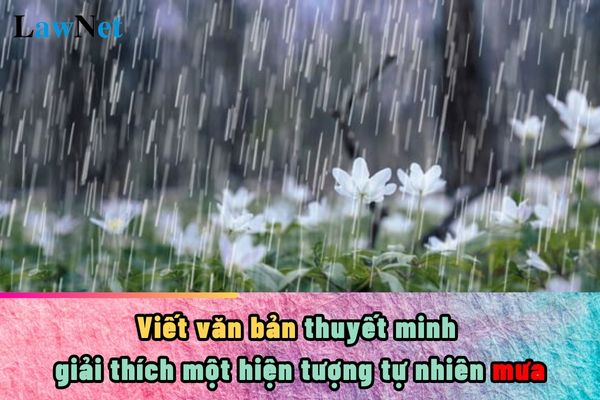What are guidelines on writing an explanatory essay on the natural phenomenon of rain for students in Vietnam?
What are guidelines on writing an explanatory essay on the natural phenomenon of rain for students in Vietnam?
Writing an explanatory essay on a natural phenomenon is one of the practice exercises in the Literature subject.
Students can refer to the following guidelines on writing an explanatory essay on the natural phenomenon of rain:
|
Guidelines on writing an explanatory essay on the natural phenomenon of rain * Understand the Phenomenon of Rain Mưa, một hiện tượng tự nhiên quen thuộc mà ai trong chúng ta cũng từng trải qua. Những hạt mưa li ti, trong suốt rơi xuống từ bầu trời, mang theo hơi mát lành, làm dịu đi cái nóng bức của mùa hè. Vậy mưa được hình thành như thế nào? Đó là câu hỏi mà nhiều người tò mò muốn tìm hiểu. Mưa bắt nguồn từ quá trình bốc hơi nước của mặt đất, sông, hồ dưới tác động của ánh nắng mặt trời. Hơi nước bay lên cao, gặp lạnh ngưng tụ thành những đám mây. Khi các đám mây no nước, những giọt nước nhỏ liên kết lại với nhau, trở nên nặng hơn và rơi xuống tạo thành mưa. Mưa không chỉ mang lại lợi ích cho nông nghiệp mà còn điều hòa khí hậu, làm sạch không khí. Tuy nhiên, mưa lớn kéo dài cũng gây ra những hậu quả nghiêm trọng như lũ lụt, sạt lở đất. Mưa là một phần không thể thiếu của tự nhiên. Âm thanh của những hạt mưa rơi xuống mái nhà, tiếng sấm rền vang, hay khung cảnh những giọt mưa long lanh trên lá cây đều gợi lên những cảm xúc thật đặc biệt. Mưa là nguồn cảm hứng bất tận cho các nhà thơ, nhà văn sáng tác nên những tác phẩm nghệ thuật tuyệt vời. |
*Note: Information is for reference only./.

What are guidelines on writing an explanatory essay on the natural phenomenon of rain for students in Vietnam? (Image from Internet)
How many periods does Grade 8 Literature in Vietnam have?
In the General Education Curriculum for the subject of Literature issued with Circular 32/2018/TT-BGDDT:
Program Timing in Classes (according to the number of learning periods)
| Grade 1 | Grade 2 | Grade 3 | Grade 4 | Grade 5 | Grade 6 | Grade 7 | Grade 8 | Grade 9 | Grade 10 | Grade 11 | Grade 12 |
| 420 | 350 | 245 | 245 | 245 | 140 | 140 | 140 | 140 | 105 | 105 | 105 |
At the upper secondary school level, each class has an additional 35 periods for elective study modules.
Time Allocation for Educational Content
The time allocated for educational content is organized by textbook authors and teachers based on the requirements to be achieved in each grade and the reality of teaching. However, it is necessary to ensure a reasonable balance between the following components:
- Between equipping knowledge and practicing skills (focus on practicing practical and applied skills).
- Between types and styles of reading, writing, speaking, and listening (allocate more time for reading literary texts).
- Between reading, writing, speaking, and listening skills (allocate more time for practicing reading skills); specifically, time distribution for skills in each grade is as follows:
| Class Group | Reading | Writing | Speaking and Listening | Periodic Assessment |
| From Grade 1 to Grade 3 | about 60% | about 25% | about 10% | about 5% |
| From Grade 4 to Grade 5 | about 63% | about 22% | about 10% | about 5% |
| From Grade 6 to Grade 9 | about 63% | about 22% | about 10% | about 5% |
| From Grade 10 to Grade 12 | about 60% | about 25% | about 10% | about 5% |
Thus, Grade 8 Literature has a total of 140 periods, in which reading comprises 63% of periods, writing 22%, speaking and listening 10%, and periodic assessment 5%.
When will students in Vietnam practice to write an explanatory essay on the natural phenomenon of rain for students in Vietnam?
Based on Section 4 of the General Education Curriculum for the subject of Literature issued with Circular 32/2018/TT-BGDDT, the content in the Vietnamese Language Knowledge section for Grade 8 Literature includes:
VIETNAMESE LANGUAGE KNOWLEDGE
1.1. Meaning of some relatively common idioms and proverbs
1.2. Nuances of word meaning and word choice
1.3. Descriptive and emotive words: characteristics and effects
1.4. Meaning of some common Sino-Vietnamese elements (e.g., vô, hữu) and the meaning of words with these elements (e.g., vô tư, vô hình, hữu quan, hữu hạn)
2.1. Auxiliary words, interjections: characteristics and functions
2.2. Separate components in sentences: characteristics and functions
2.3. Statements, questions, commands, exclamations; affirmative and negative sentences: characteristics and functions
3.1. Rhetorical measures of inversion and rhetorical questions: characteristics and effects
3.2. Explicit and implicit meanings of sentences
3.3. Aspects of deductive, inductive, parallel, and combined paragraphs: characteristics and functions
3.4. Text types and genres
- Narrative texts: essays recounting a journey or a social activity
- Expressive texts: six-line, seven-line poems; paragraphs reflecting emotions about a six or seven-line poem
- Argumentative texts: thesis, thesis points, evidence and arguments; discussions on a social issue; analysis of a literary work
- Informative texts: objective information, subjective opinions, and purpose of the text; explanatory essays explaining a natural phenomenon; introductions to a book; petition texts
4.1. Generic and regional language: function and value
4.2. Social jargon: function and value
4.3. Non-verbal communication means: images, data, charts,...
Thus, writing an explanatory essay explaining a natural phenomenon is part of the Grade 8 Literature curriculum.

